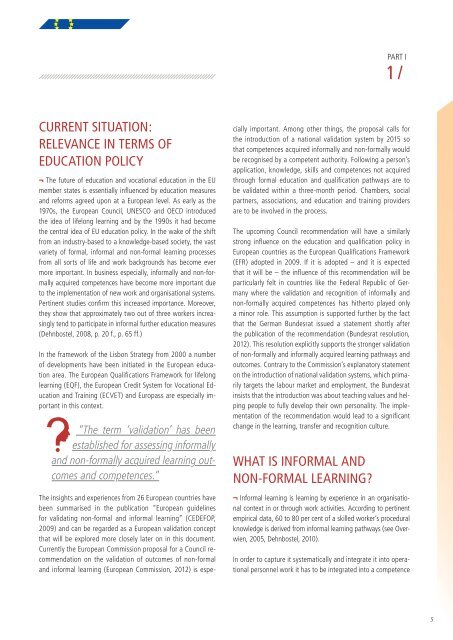RECOGNITION OF NON-FORMAL AND INFORMAL ... - Solidar
RECOGNITION OF NON-FORMAL AND INFORMAL ... - Solidar
RECOGNITION OF NON-FORMAL AND INFORMAL ... - Solidar
Create successful ePaper yourself
Turn your PDF publications into a flip-book with our unique Google optimized e-Paper software.
PART I<br />
1 /<br />
CURRENT SITUATION:<br />
RELEVANCE IN TERMS <strong>OF</strong><br />
EDUCATION POLICY<br />
¬ The future of education and vocational education in the EU<br />
member states is essentially infl uenced by education measures<br />
and reforms agreed upon at a European level. As early as the<br />
1970s, the European Council, UNESCO and OECD introduced<br />
the idea of lifelong learning and by the 1990s it had become<br />
the central idea of EU education policy. In the wake of the shift<br />
from an industry-based to a knowledge-based society, the vast<br />
variety of formal, informal and non-formal learning processes<br />
from all sorts of life and work backgrounds has become ever<br />
more important. In business especially, informally and non-formally<br />
acquired competences have become more important due<br />
to the implementation of new work and organisational systems.<br />
Pertinent studies confi rm this increased importance. Moreover,<br />
they show that approximately two out of three workers increasingly<br />
tend to participate in informal further education measures<br />
(Dehnbostel, 2008, p. 20 f., p. 65 ff.)<br />
In the framework of the Lisbon Strategy from 2000 a number<br />
of developments have been initiated in the European education<br />
area. The European Qualifi cations Framework for lifelong<br />
learning (EQF), the European Credit System for Vocational Education<br />
and Training (ECVET) and Europass are especially important<br />
in this context.<br />
“The term ‘validation’ has been<br />
established for assessing informally<br />
and non-formally acquired learning outcomes<br />
and competences.”<br />
The insights and experiences from 26 European countries have<br />
been summarised in the publication “European guidelines<br />
for validating non-formal and informal learning” (CEDEFOP,<br />
2009) and can be regarded as a European validation concept<br />
that will be explored more closely later on in this document.<br />
Currently the European Commission proposal for a Council recommendation<br />
on the validation of outcomes of non-formal<br />
and informal learning (European Commission, 2012) is espe-<br />
cially important. Among other things, the proposal calls for<br />
the introduction of a national validation system by 2015 so<br />
that competences acquired informally and non-formally would<br />
be recognised by a competent authority. Following a person’s<br />
application, knowledge, skills and competences not acquired<br />
through formal education and qualifi cation pathways are to<br />
be validated within a three-month period. Chambers, social<br />
partners, associations, and education and training providers<br />
are to be involved in the process.<br />
The upcoming Council recommendation will have a similarly<br />
strong infl uence on the education and qualifi cation policy in<br />
European countries as the European Qualifi cations Framework<br />
(EFR) adopted in 2009. If it is adopted – and it is expected<br />
that it will be – the infl uence of this recommendation will be<br />
particularly felt in countries like the Federal Republic of Germany<br />
where the validation and recognition of informally and<br />
non-formally acquired competences has hitherto played only<br />
a minor role. This assumption is supported further by the fact<br />
that the German Bundesrat issued a statement shortly after<br />
the publication of the recommendation (Bundesrat resolution,<br />
2012). This resolution explicitly supports the stronger validation<br />
of non-formally and informally acquired learning pathways and<br />
outcomes. Contrary to the Commission’s explanatory statement<br />
on the introduction of national validation systems, which primarily<br />
targets the labour market and employment, the Bundesrat<br />
insists that the introduction was about teaching values and helping<br />
people to fully develop their own personality. The implementation<br />
of the recommendation would lead to a signifi cant<br />
change in the learning, transfer and recognition culture.<br />
WHAT IS IN<strong>FORMAL</strong> <strong>AND</strong><br />
<strong>NON</strong>-<strong>FORMAL</strong> LEARNING?<br />
¬ Informal learning is learning by experience in an organisational<br />
context in or through work activities. According to pertinent<br />
empirical data, 60 to 80 per cent of a skilled worker‘s procedural<br />
knowledge is derived from informal learning pathways (see Overwien,<br />
2005, Dehnbostel, 2010).<br />
In order to capture it systematically and integrate it into operational<br />
personnel work it has to be integrated into a competence<br />
5
















